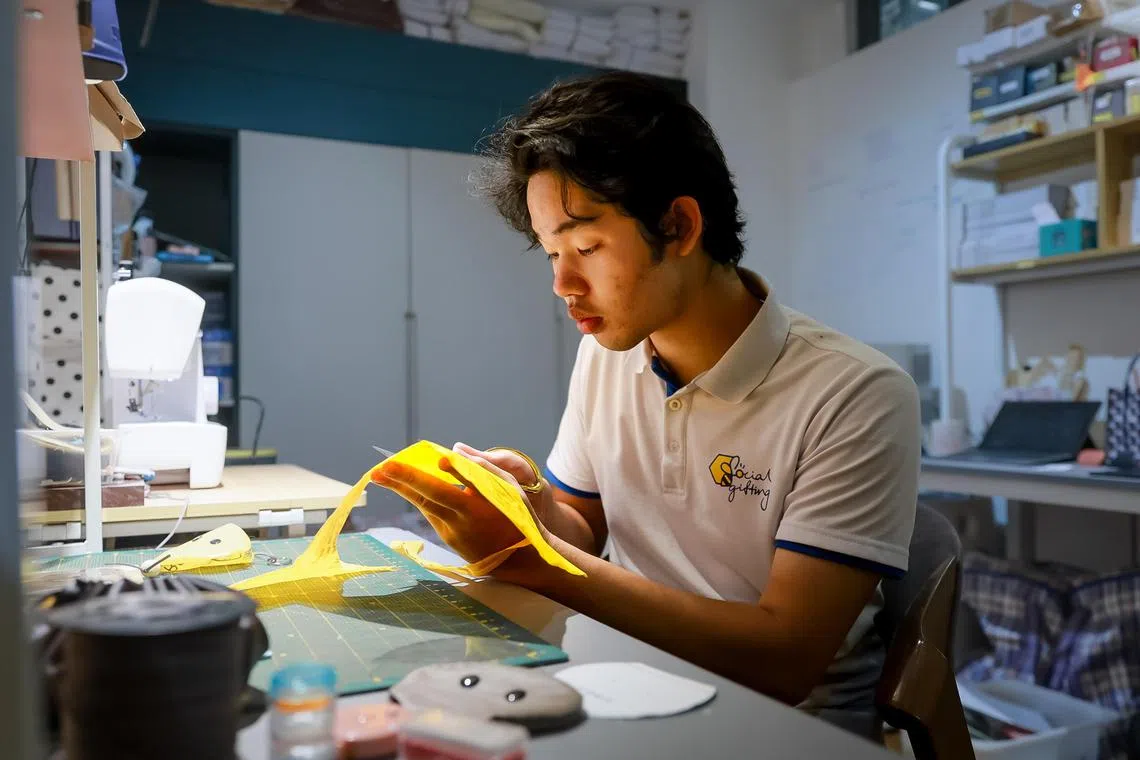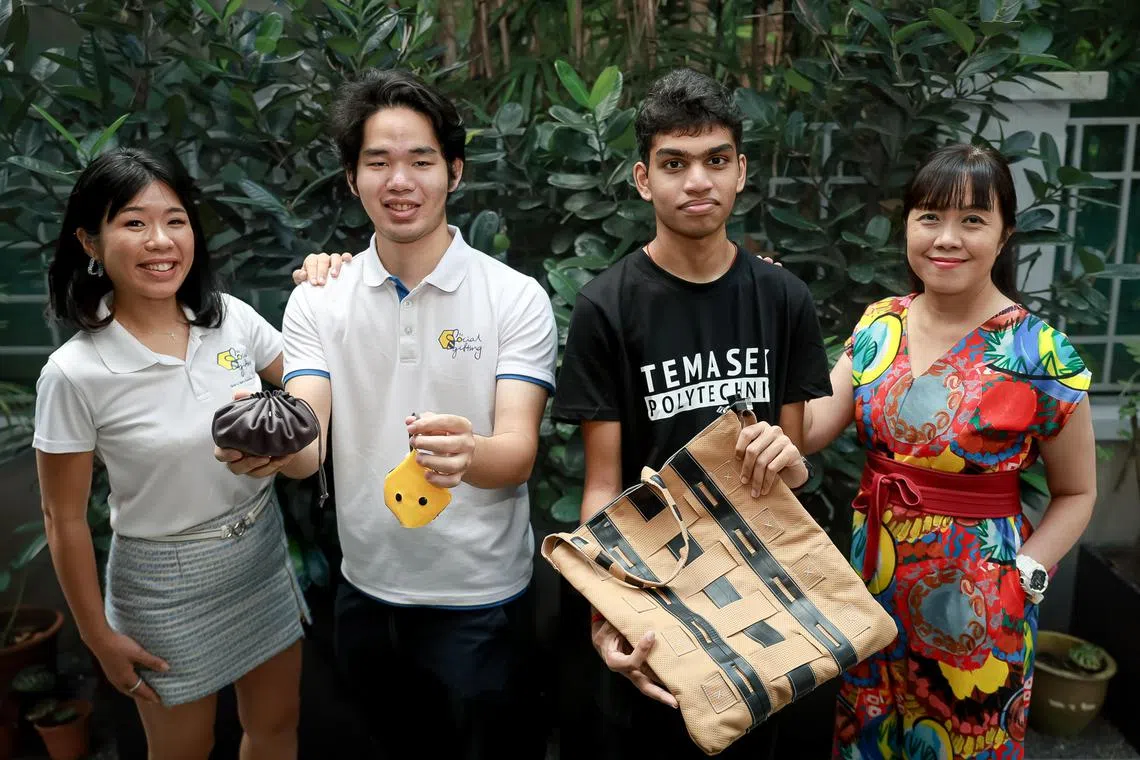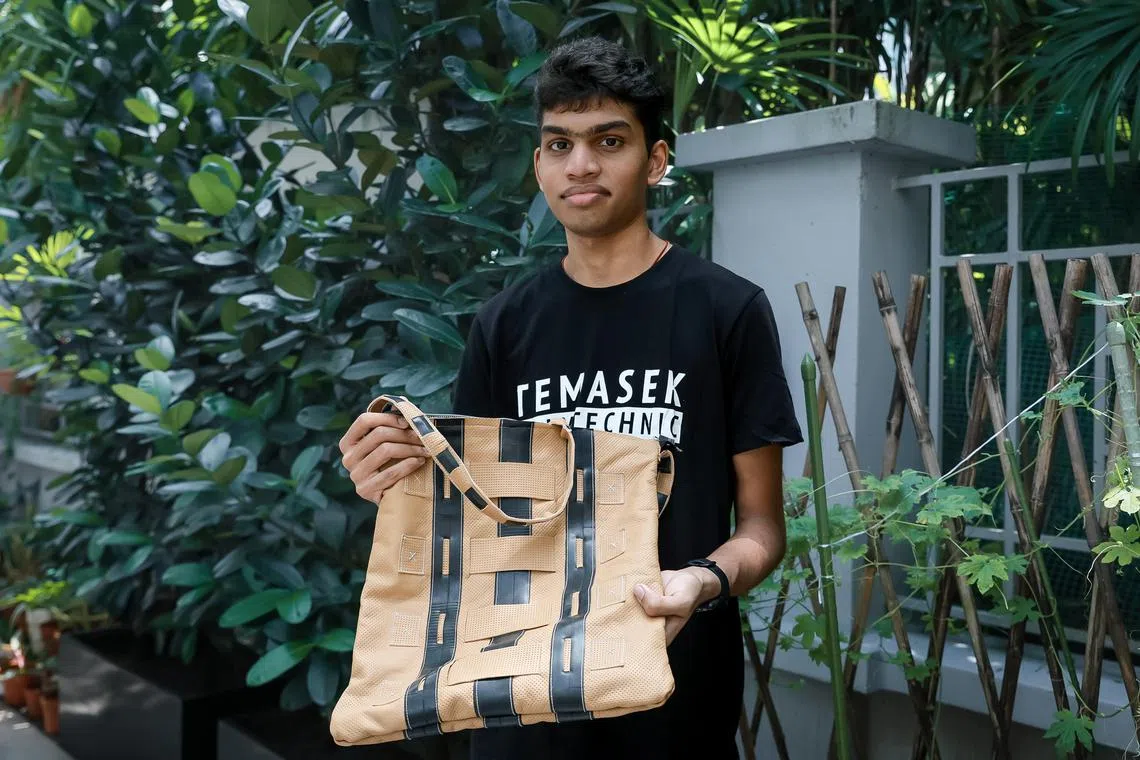Student with autism gives back to disabled community through Temasek Poly’s design challenge
Sign up now: Get ST's newsletters delivered to your inbox

Temasek Polytechnic student Tang Wen Xi working on his Baobei series, which consists of a pouch, cardholder and keyholder made from upcycled SIA materials.
ST PHOTO: GAVIN FOO
SINGAPORE - Mr Tang Wen Xi, 20, was diagnosed with mild autism at the age of five. He attended Pathlight School from 2010 to 2016, before moving on to St Hilda’s Secondary School, where he completed his O level examinations in 2020.
Now a student at Temasek Polytechnic (TP), he was thrilled to have the opportunity to give back to the special needs community and coach people with disabilities (PWDs).
As a student pursuing a Diploma in Product and Industrial Design – now known as Product Experience and Design – he had to take part in a design challenge as part of his second-year core module.
The challenge was part of TP’s partnership with SG Enable – an agency dedicated to enabling PWDs – requiring its students to design a product with sustainable materials that PWDs can replicate.
“We had to make products upcycling materials from Singapore Airlines. What we were given were life vests and the leather from the headrests,” he said.
There were many considerations he had to take into account when conceptualising the design of his product series.
“How can we make it easier for the PWDs to make? What sort of linkages can we use to tie it to Singapore? And what is its market appeal?”
As an answer to all these questions, Mr Tang created the “Baobei” series consisting of a pouch, cardholder and keyholder.
He drew inspiration from the Disney short film Bao, as his products were small and of sentimental value to him.
He is currently working as an intern with Social Gifting, a social enterprise, to teach PWDs how to create these products so that they can be sold for income.
He recognises the need to continually change his original designs in order to make them manageable for PWDs to replicate. This was his biggest challenge as there was a lot of trial and error involved.
Despite the initial hurdles, he is happy that through this experience, he got to transition from being a beneficiary to a giver, and from a student to a coach.
Apart from the positive impact he has had on others through this endeavour, he also learnt the importance of communication and resilience.
“Asking for help is not a bad idea,” said Mr Tang. “If you try and fail, just try again.”
Ms Emily Ong, the director of Enabling Village and strategy and innovation at SG Enable, said this design challenge was initiated to change mindsets about the talents PWDs possess and provide them with alternative pathways to use these talents.

(From left) Chief empowerment officer of Social Gifting Valen Tan Husistein, Temasek Polytechnic students Tang Wen Xi and Yugaprasad Ramesh, and director of Enabling Village and strategy and innovation at SG Enable Emily Ong.
ST PHOTO: GAVIN FOO
“It’s not just about selling things or producing things to sell. It’s also about building capabilities and giving hope and dignity to all this talent that we have,” said Ms Ong.
According to her, it is not always easy to find good design. That is why TP’s students from the school of design were encouraged to take part in this challenge.
Mr Yugaprasad Ramesh, 20, is another student who took part in the design challenge and whose prototype has been selected by SPD (formerly the Society for the Physically Disabled) – a charity set up to help those with disabilities – for reproduction.
Like Mr Tang, Mr Yuga had to do several iterations of the original design for his canvas bag in order to make the designs manageable for the PWDs to replicate while minimising the possibility of sustaining injuries.
“I have to consider that the (PWDs) who are going to end up doing this are artisans with determination,” he said.

Temasek Polytechnic student Yugaprasad Ramesh with a bag from his Paxton collection.
ST PHOTO: GAVIN FOO
After many discussions with his group members, they came up with the Paxton – short form for pattern interconnection stitching – collection, which consists of a clutch bag, pouch and pencil case.
Mr Yuga said this was an eye-opening experience as he went to the SPD headquarters to understand how PWDs work and what their limitations were, before factoring all these considerations into the design of his prototype.
He feels that this is something unique because people usually think that certain products in the market are manufactured by a company, and not done by PWDs.
“Now I have a clear understanding that you don’t really know the true meaning of every product until you know the story behind it,” he said.



